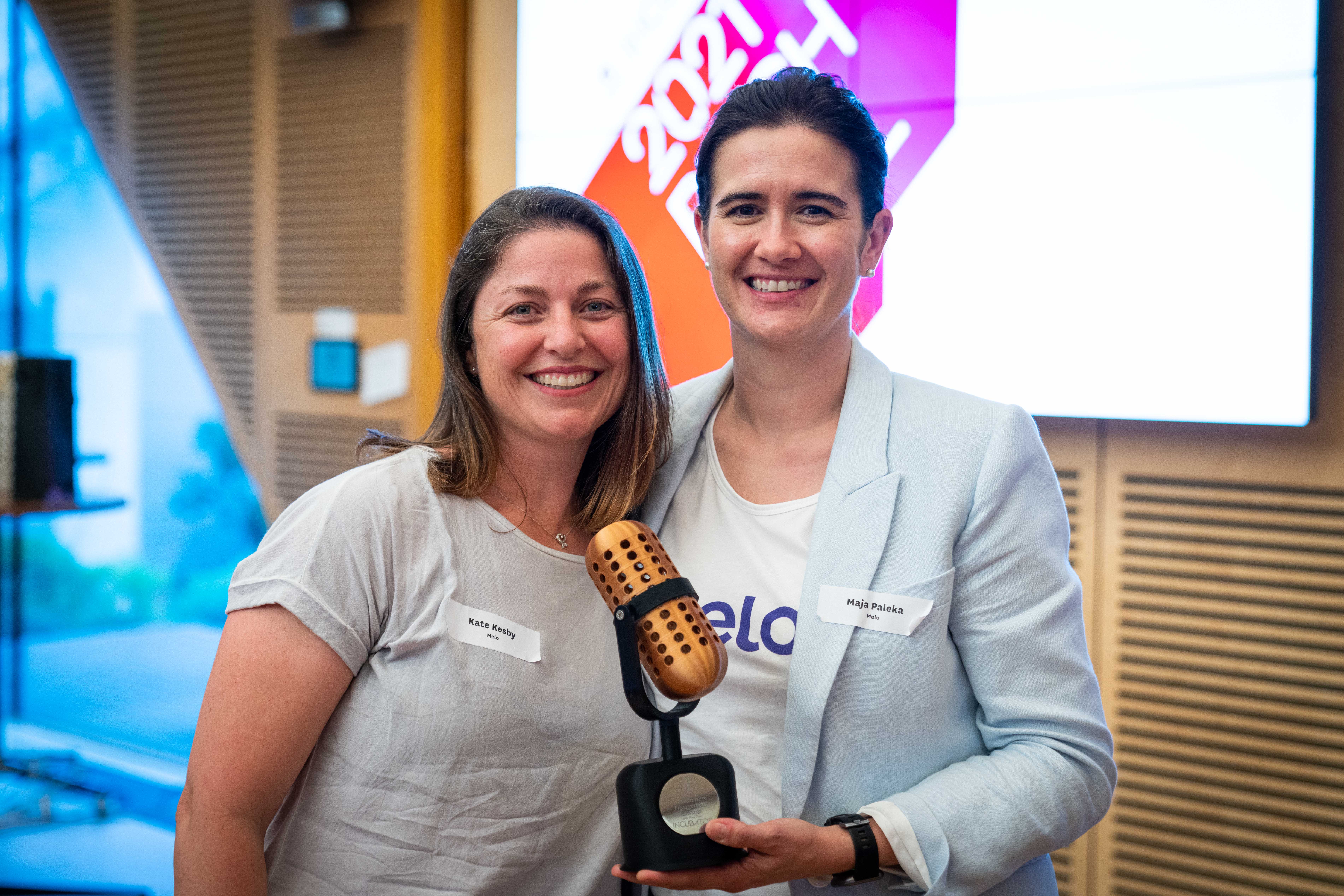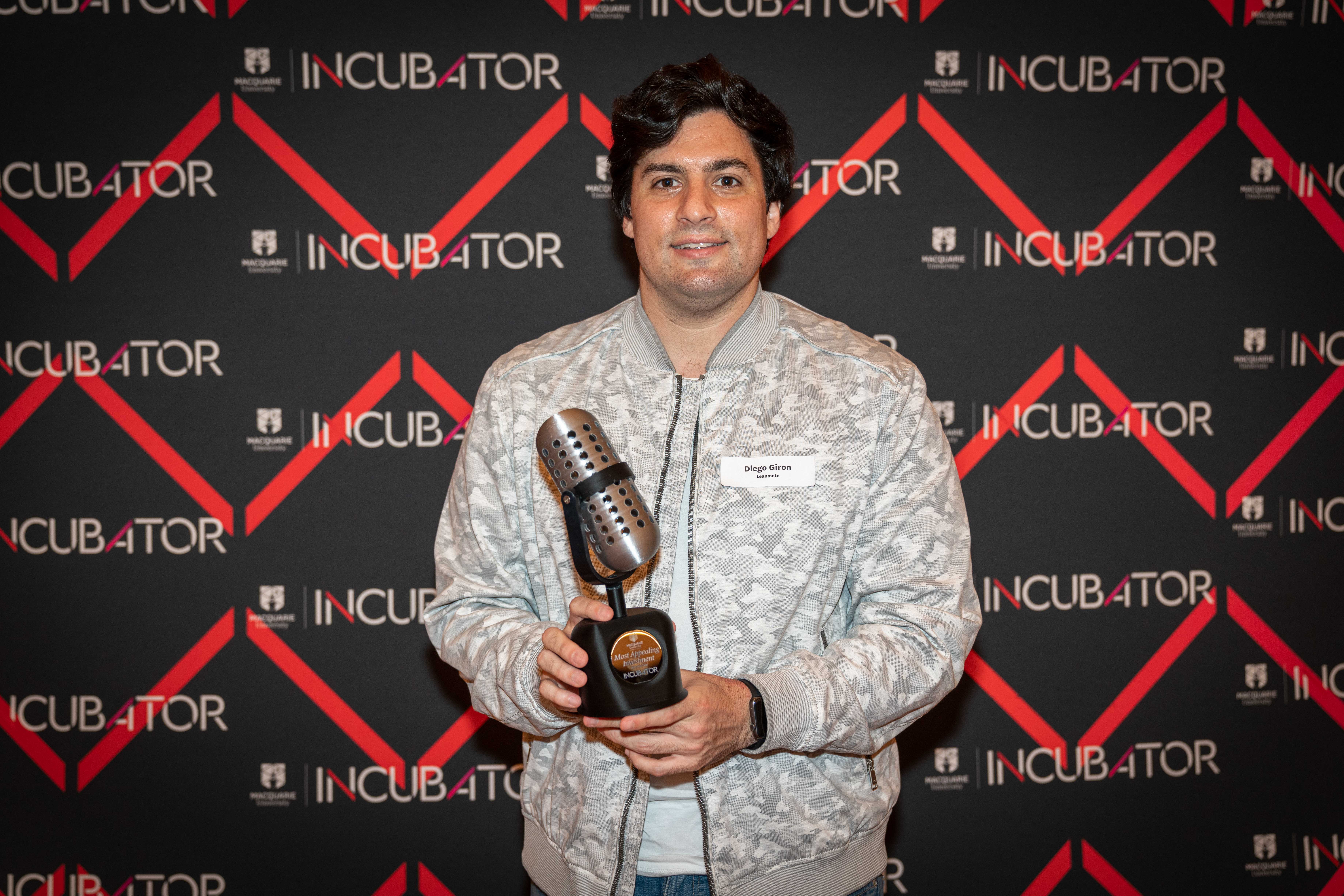Pitching up: two stand out at MQ Incubator Pitch Final
By Jen Waters
Macquarie University Incubator celebrated its annual night of nights on Friday 24 November with the much-anticipated 2021 Pitch Final – the first face-to-face event held at the Incubator post-lockdown.
Resident startups took to the stage to showcase their pitching skills and the innovative vision for their businesses to a mix of in-person and online attendees, including investors, mentors, resident startup companies and University leaders.
Among the five startups to pitch were melo, GLIA Diagnostics, beHubâ, Schneider Electric’s SME Decarbonisation Network and Leanmote. Each founder group had three minutes to introduce their business and outline their value proposition, markets, customers, business model and team. They also must demonstrate a clear vision for the future and make an ask for investor support.
The high standard set a challenging task for the esteemed judging panel, comprised of Sustainable Schoolwear, Workwear and Worn Up founder Annie Thomson, AusIndustry Accelerating Commercialisation Program Facilitator Vanouhi Nazarian, Curious Thing COO Hamish Hawthorn, Jelix Ventures CEO Andrea Gardiner, and Professor Dan Johnson, Macquarie University’s Pro Vice-Chancellor: Research, Innovation and Enterprise.
In what has been a tough year since the last Pitch Final, MQ startups have shown incredible resilience and optimism, continuing to innovate, build their businesses and develop compelling messaging. In the end, two emerged victorious: melo took out both Best Pitch and the Researcher Engagement Award, while Leanmote earned the title of Most Investible Idea. Schneider Electric’s SME Decarbonisation Network received an honourable mention for this pitch.
The Best Pitch and Most Investible Idea awards each received a $3,000 prize, while melo’s Researcher Engagement award offers up to $50,000 in funds and opportunities to build further relationships with MQ researchers and HDR students.
melo
Best Pitch
Researcher Engagement Award
Family life is busier than ever, and the notion of one parent managing home and children while the other works is no longer the norm. But despite this, the mental load – that seemingly endless mind-list of household tasks, from school excursion permission notes to buying a present for Grandma’s birthday or picking up bread and milk – often still falls to one person.
melo is driving the shift away from traditional models that no longer serve us to reimagine the way families are run. The brainchild of co-founders Rebecca Sebastian, Kate Kesby, Maja Paleka and Fraser Stirling, it helps households evenly distribute tasks, improving not just efficiency but relationships, wellbeing and family harmony.
“We’re all still operating under the primary care model in many ways; it’s in-built in our structures, systems and processes, and that shows up in our behaviours,” Paleka explains.
“No matter how equal a marriage is, once children arrive and maternity leave finishes we often end up going backwards, and society reinforces that. We know that behavioural change doesn’t result from talk alone, and we’ve looked to the corporate approach of systems and processes based on doing things differently to nudge human behaviour.”
The principle of effective teamwork is at melo’s core. Tasks are well-defined and allocated, and the user-friendly dashboard means everyone can see the bigger picture – and easily pick up a task when someone else can’t get to it. All part of a larger program and methodology empowering families to shift the way they operate, it places everyone on the same page and creates an environment where discussion is rational rather than emotional.
Paleka says that winning the Researcher Engagement Award is an exciting boost for melo.
“We’re excited to be working with Macquarie University researchers to ensure the product is and remains truly evidence-based, supported by the latest behavioural science and psychology. We’re also planning to build in AI capability enabling the app to learn and predict tasks so that you don’t need to remember to add them, further reducing the mental load.”
The startup is currently running select user trials on its MVP ahead of a wider pilot next year, focusing on the business-to-business market.
“Companies want practical ways to support the wellbeing of their employees, particularly within the talent stream of dual-income families. We’re also aiming to expand internationally in the next few years as we work with some of those major multinational corporations.”
Leanmote
Most Investible Idea
The global pandemic has forever shifted the way we work, with many employees and employers now committed to working remotely in the longer term. Getting the best from teams spread across the country and around the globe – and supporting the health and wellbeing of every member – requires a new approach to managing, connecting and driving collaboration.
Leanmote is leading the revolution in remote work to help businesses build efficient, healthy and productive remote teams. Created by co-founders Diego Girón and Rodrigo Paredes, the easy-to-use engagement and wellbeing platform provides continuous feedback for leaders to help them align individual and organisational efforts, improve remote employee morale and wellbeing and boost staff retention.
The idea was born when Argentinian-raised Girón relocated to Australia with his wife shortly before Australia’s first lockdown in 2020. Despite a successful career as a civil engineer, without local experience he struggled to find work, weathering over 500 knock-backs before deciding to pursue his long-held interest in the tech sector. Then Covid arrived, and with it, a compelling entrepreneurial opportunity.
“The sudden shift to remote work created a disconnection between employees and the companies they were working for. People were stressed and working longer hours because of the lack of separation between work and home. Managers had little visibility of what was happening at the other end of their screens, too, making it difficult to coach and support their teams,” Girón explains.
“We wanted to create a solution that integrates real-time data and insights to inform decision making and encourage honest conversations about what people need to work and be at their best – wherever they are in the world.”
The company launched its prototype in March this year, working with Macquarie University doctoral researchers in organisational psychology and wellbeing to build evidence-based models into the platform. Today Leanmote is embedded in 17 companies across Australia, France, Germany, Estonia and Nigeria, with more coming on board each month.
Armed with the market validation of its Pitch Final win and an incoming NSW Government grant, Girón says refining sales and marketing, attracting investors, and building Leanmote’s smart recommendation capabilities are next on the agenda.
“In the long term, we want Leanmote to be a game-changer in the corporate wellbeing sector – a market-leading platform that doesn’t just improve performance, but genuinely helps people create wellbeing habits at home.”

